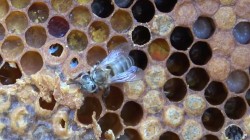Robotic spies among bees
The 20th of May has been declared World Bee Day by the United Nations. Bees and wild pollinators are crucial to ecosystem biodiversity and food security, and they have been used as bioindicators of environmental pollution for decades. Now a team of scientists from the University of Graz, Austria, have developed autonomous little robots that interact with bees and are accepted as members of their society. Understanding and influencing the bees’ behaviour, from inside the hive for the first time, will help to develop new methods to protect this species and hence the environment. The study runs under the ASSISIbf project, supported by the research programme on Future and Emerging Technologies of the European Commission. The protection of species facing threats is not the only goal. Robots, integrated in animal societies, could be used in biomedical research and, for example, for the management of domestic animal stocks. Another experiment, also running under ASSISIbf, takes place in Lausanne, Switzerland. Here, researchers from the École Polytechnique Fédérale de Lausanne (EPFL) have developed a fish robot that can integrate perfectly into schools of zebrafish. The robot can influence the fish’s behaviour, but also adapts its own behaviour, by learning how to communicate and move like they do. These technologies aim to lay new foundations in the ways humans can interact with and learn from animal societies. Watch the video here: http://www.fetfx.eu/story/robotic-spies-among-bees/ By Rebecca Parsons
Keywords
bees, environment, FET, technology
Countries
Austria, Switzerland



